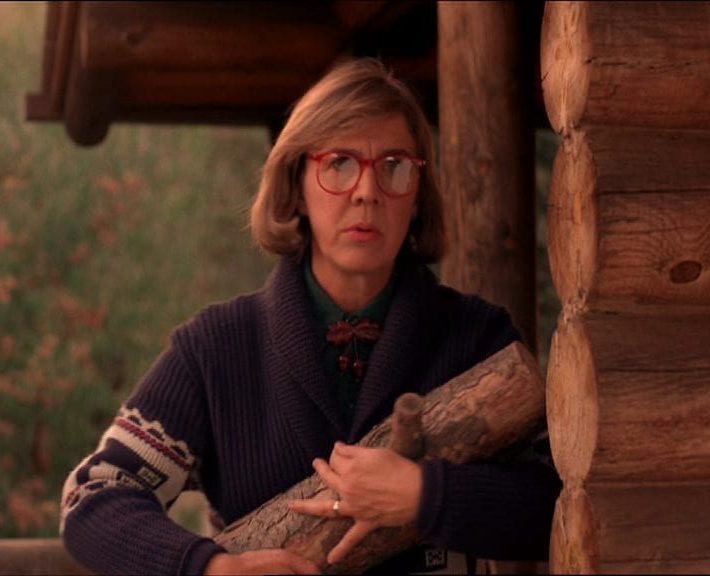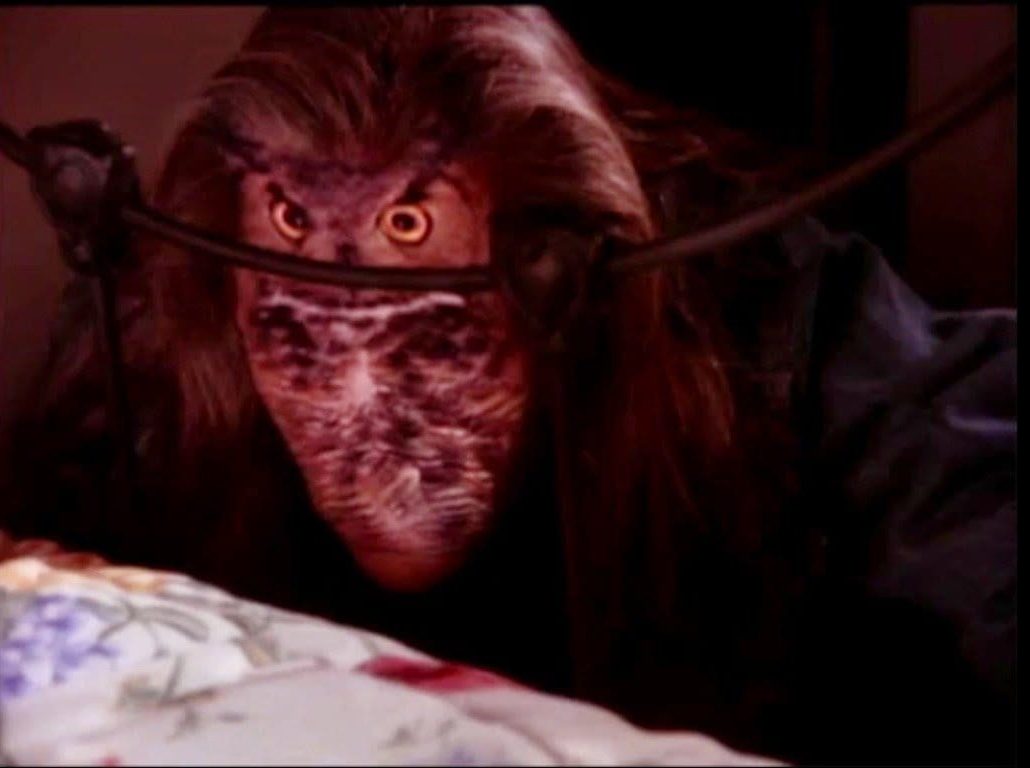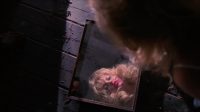Once upon a time, Lindsay Stamhuis and Aidan Hailes had a podcast that went by Bickering Peaks. They looked into every piece of Twin Peaks, David Lynch and Mark Frost as they could, and their analysis was top tier. Once there was nothing left to dig into, they shifted their focus and continued the podcast as The Bicks. What is their focus these days? Shakespeare.
Aidan and Lindsay use the same thorough approach to look into historical context just as much as they do the Bard’s work itself. And today they bring their unique perspective to 25YL in this conversation with John Bernardy, wherein they discuss the story space that Shakespeare and Twin Peaks share (there’s a lot!)
JB: Ever since you decided your next podcasting focus was going to be the works of Shakespeare, I’ve been dying to know what you think about their connections to Twin Peaks. Thanks for letting me pick your brains about it!
Bicks: Thanks for asking us! This was something that we hadn’t really thought about much before, but once you’d asked the question, a lot of thoughts began percolating (alongside the fish, of course)
JB: Shakespeare has multiple appearances in Twin Peaks, oftentimes from direct quotes by Ben Horne, but I know it’s way more than that.
Bicks: “The evil that men do” is a direct quote from Julius Caesar. Sonnet 18 makes an appearance when Ben arrives at One Eyed Jacks. Ben also quotes The Tempest when he tells the “new girl” that this is “such stuff as dreams are made on” — an evil reference to dreams, may be relevant to our discussion.
JB: Most definitely, but I want to start with a different kind of dream: A Midsummer’s Night Dream. With the way Twin Peaks used its story to reference everything from Vertigo to the Fugitive, to Shakespeare plays, do you think there are (blatant or happenstantial) similarities with how Dale entered the Lodge in his dream and how the humans entered Faerie in MND?
Bicks: Hmm… Midsummer is very aware of its dream qualities. It’s right there in the title. And Puck’s closing speech (“If we shadows have offended/think but this and all is mended: / That you have but slumbered here / While these visions did appear”) makes it very blatant: if you didn’t like what you’ve seen, well, just think that you fell asleep here and all of what you’ve seen is a dream. The feeling I get from the European ending is that it was the offensive dream, and the repurposing of it into a literal dream in what became the Twin Peaks series is kind of the same thing but it’s also the opposite. It says “This stuff we filmed, this story we wrapped up, that was actually a dream that leads us deeper into the mystery.” So rather than explaining everything away as a dream, it uses the dream to draw us deeper. Puck gives us permission to dismiss the dream; Cooper forces us to embrace it.
JB: Does the dream act as a complicating factor for accountability and culpability in Shakespeare? I know in Peaks, you can blame Leland’s actions on BOB from a certain point of view. The Shadow Trap podcast was explaining how in real life people used to be able to blame infidelities and teenage pregnancies (among other things) on being taken over by Faeries. Seems similar in concept to being under the control of Lodge spirits.
Bicks: Very much so. At a certain point in time, people did blame their transgressions on others. They blamed everyone on others. A bad turn in fortune literally happened because Fortune turned her wheel and where you once were up, now you’re down. This was an accepted fact. And even to this day, “crimes of passion” are almost seen as being committed while the person is under the influence of something that makes them not act like themselves. So while it does seem like a rather convenient excuse for Leland’s behaviour, it does have a historical underpinning. (Doesn’t make it right, of course…)
For Shakespeare in particular, there’s a definite sense that some magic makes someone incapable of controlling themselves. The fact that Demetrius winds up loving Helena in Midsummer Night’s Dream makes it seem as if magically-induced love is just as powerful as the all-natural version of it. A similar vein runs through Macbeth—would he have sought out power if the witches hadn’t predicted he would become king but beget none? The supernatural generally is seen to be all-powerful, beyond the ability of mortals to resist.
JB: The more I learn about Shakespeare, the more I think there’s an explicit connection, but I’m curious how you feel about it: how connected are the Lodge mythology aspects to Shakespeare’s Faerie Kingdom?
Bicks: That’s a tricky question to answer without being in the brain of Lynch/Frost. I mean, without a doubt, they were inspired by Shakespeare at some pretty key moments. I think Richard Beymer’s history as a Shakespearean actor influenced the numerous Shakespearean speeches that Ben Horne is given in the show, for instance. In other instances, I think it’s happenstance. The numerous dream references, for example — were Lynch and Frost explicitly calling on Shakespeare, or are they simply tapping into the archetypal well of human experience around dreams?
On the surface, it is pretty easy to retrofit the Lodge into Shakespeare’s faerie world. Again, the archetypes are there as well so maybe Shakespeare and Lynch/Frost are simply drawing on that same wellspring of common knowledge instead of directly and specifically calling back to Shakespeare.

JB: That makes sense. Let me step back; we know dreams are intertwined in Twin Peaks. How Connected to dreams is the Faerie kingdom in Shakespeare’s work? And, how do dreams figure into Shakespeare’s work, anyway? (I assume a lot considering how tightly Neil Gaiman connected Shakespeare into Sandman).
Bicks: Dreams are fascinating things in Shakespeare. Caesar’s wife, Calpurnia, has a dream that her husband will be murdered if he goes to the Senate on the Ides of March in Julius Caesar; Cassandra has dream-like visions that foretell the sack of Troy in Troilus and Cressida. Often, Shakespeare uses dreams and visions as shorthand for the mystical or the supernatural. They’re part of the same fabric that brings us the faeries and witches and soothsayers. There are some interesting studies of Shakespeare’s use of dreams that link it to the act of performing or attending a play. It’s made explicit in Midsummer’s closing speech, but aren’t all plays (and, by extension, tv and film) dream-like? Don’t we suspend disbelief for a period of time and agree that this world we’re watching is as real as the one in which we’re sitting down and watching it in the first place? There’s a real playfulness there with Shakespeare in that he seems to want us to question what’s real and what’s not. Lynch and Frost are interested in the same kinds of questions, especially how Twin Peaks also contained a show within a show in the first season, and also blurred the lines between the Red Room as a place in a dream, and then turned it very real in subsequent episodes.
JB: Faeries seem to capture the imaginations of young people, those in love, or under pressure. Seems like there may be some connections to how Sam and Tracy seemed to call out the creature in the glass box. Do you see Shakespeare connections here?
Bicks: Maybe. That’s an interesting question as well… heightened emotion does seem to bring about a lot of trouble no matter which literary tradition you’re looking at. The mere sight of Juliet makes Romeo bust out the iambic pentameter, right? In Sam and Tracy’s case, it does seem to call something forth—love and fear open the doors. I think it was Diane Podcast that had an episode about that phenomenon when the show was airing that was tremendously informative from a folkloristic point of view. Are there also Shakespearean connotations? Hmm… I think if there are, it’s probably because both Shakespeare and Lynch/Frost are drawing on the same cultural touchstones.
JB: Like how Faerie lore and grey aliens abduction stories have a lot in common?
Bicks/LS: As much as Twin Peaks has created its own internal logic for the Lodge, it’s not like that was created whole-cloth from nothing. I would think it’s nearly impossible not to be indebted to things like the faerie world that exist in other stories, to some degree or another. Almost every culture has some kind of mythology about folk who live in a dimension adjacent to ours and who play with us in some way — trickster figures in First Nations mythology, Djinni in Arabic mythology, Banshees in European mythology, and so on. Lodge denizens seem to act in ways similar to a lot of creatures from faerie lore, so I think it’s easy to see them as such. I guess the question comes down whether or not that was deliberate? I don’t know if anyone aside from Lynch and Frost can answer that.
JB: I definitely want to get back to tricksters, but I’m thinking how the woods are one of those common factors. The Lodge and Faerie kingdom both seem to be where people and nature meet. Specifically in the woods.
Bicks: Forests really are liminal spaces in so much folklore, aren’t they? And Twin Peaks is so heavily indebted to folklore! They’re places of mystery and realms where the Other live. I think the fear of the forest that is present in Twin Peaks is absolutely an extension of that—the closer you are to the forest, the more in tune with their power you are. And when you live in the forest entirely, the way the Log Lady does, or like Titania and Oberon in MND…

JB: You can say this about both the Lodge denizens and Shakespeare’s faerie characters: There’s an observer effect…someone needs to recognize them for them to take shape.
Bicks: Well it was really taken for granted that faeries were real during the Elizabethan time, so the people watching A Midsummer Night’s Dream would have been like “Of course, this makes sense” because they honestly believed that faeries could influence human beings. Within the play, the effects the faeries have are real even though no one (aside from the audience) sees them… but maybe belief is all that’s required for manifestation to occur. Very Peter and Wendy-ish, in that way—when you stop believing in Tinkerbell, she ceases to exist.
I wonder if that’s what’s happening in Twin Peaks, because the Lodge denizens exist and exert control whether you see them or acknowledge them or not. And if they aren’t really meant to be real—if BOB, for example is “the evil that men do” —then what does that mean?
JB: That makes me think of what Harry said to Cooper in the Double R about there being an evil in the woods. The residents of Twin Peaks also believe in the Lodginess!
Bicks: Precisely. Belief in Lodginess creates the necessary conditions for the existence of the Lodge, almost. The further you are from that threshold of belief, it seems, the further you are from its effects. Norma, for instance, is not affected because she’s not connected; there’s no outward indication of her belief in the Lodge or in Lodge entities. But Margaret Lanterman is deeply entwined, and her belief extends to the core of her being. For her, there’s no separating the real world from the Lodge.
In Shakespeare, it doesn’t seem to matter, but that’s a byproduct of that Elizabethan idea that they exist whether you believe it or not. And everyone believed, to some extent. So everyone was affected. It’s perhaps one notable difference.
JB: How tied to original Trickster mythology is both Shakespeare and Twin Peaks? Do you see them referencing the same source material here?
Bicks: Again, that is really hard to say… some of these trickster figures are so deeply ingrained in our collective psyche that it might be impossible to pick them apart and tease out where inspiration came from. I don’t think Shakespeare was referencing First Nations mythology; at the time he was writing his plays, North America was only newly colonized and so I doubt that he was consciously integrating their myths into his writing. But there are so many examples of similar legends and myths that crop up around the world (how many cultures have origin stories involving a great flood, for example?) that it is certainly possible that, say, a mythical character like Robin Goodfellow/Puck from English folklore and BOB share the same kind of lineage, simply because it appears to be human nature to construct stories involving tricksters.
JB: BOB and Pan seem comparable as forces of chaos, but how comparable?
Bicks: Oh, there’s definitely a comparison to be made here. Setting aside the fact that BOB is an agent of pure evil (if he even exists in our physical reality — there is a credible argument to be made that he is a psychological evil as “the evil that men do”) they are both forces that interject themselves into the lives of human beings for their own enjoyment. BOB is “ready for fun”; Puck is mischievous and bored. Puck’s machinations only result in a case of mistaken identity and love gone awry, but I think in general they operate in very similar manners.

JB: After Trickster mythology, there are all the other Lodge and faerie characters that seem to operate under different rules than BOB or Puck. Some Faeries seem to commit pranks and some do chores, while the Lodge denizens seem to help and sometimes hurt us. But both are too abstract to reveal the purpose behind their actions. I’m curious what you make of them.
Bicks: Faeries in Shakespeare really do seem to exist purely to muck things up for humans. They’re not as openly hostile to humans as BOB is, but in their playfulness they do mess with the natural order of things. But within that, there are varying degrees. Titania and Oberon are rulers of the fairies in Midsummer and do things purely for their own entertainment; Peaseblossom and Cobweb and Mustardseed and Moth are “gofers” who do their bidding but have no real agency. Puck is somewhere in between.
If we include characters like Margaret Lanterman or Carl Rodd as Lodge (or Lodge-adjacent) figures, then I see links between them and characters like Cassandra or Calpurnia: characters who are real and exist in our world but who have some kind of connection to another world that gives them insight or abilities to sense things beyond this physical world. When Juliet dreams that she sees Romeo laid low in a tomb and foreshadows his and her eventual death, it reminds me very much of Margaret’s warning to Laura in Fire Walk With Me. I don’t know what rules they operate under, but it seems as though they’re connected to something beyond what we can see, and that connection gives them unique abilities. Certainly, Elizabethan audiences would have recognized that those connections to another world gave these characters supernatural abilities; I think in Twin Peaks we recognize that too.
JB: Are Faeries accountable to our world’s rules? Are the Lodge denizens?
Bicks: I think it depends on where they are. I mean… Puck turns Bottom into a literal donkey in order to make Titania fall in love with an ass. But that’s when they’re in the forest; they’re on faerie turf. Before the lovers and the Rude Mechanicals can go back to civilization, the faeries have to restore order, and that’s because Elizabethan drama dictates it. The same rules don’t need to apply to Twin Peaks; we may not like it when Cooper is left on a cliffhanger ending for nearly 30 years as a result of BOB’s evil machinations, but it’s allowed to happen. I think the realism of Twin Peaks — meaning the fact that it is set in the real world, for the most part — does limit what effect the Lodge denizens have on the people “out there”. In the Lodge or the Red Room or wherever it is that Cooper spends most of the first few episodes of The Return, however, all bets are off.
So I guess my answer is: When you’re on Lodge or faerie turf, the rules are far more flexible.





Enjoyed reading this.
“So I guess my answer is: When you’re on Lodge or faerie turf, the rules are far more flexible”
The last line was my favorite quote. I find it interesting you talk about Shakespeare and Twin Peaks especially since I have made art specific to both.
In The Blink Of An Eye (inspired by Twin Peaks Season 2 Episode 2)
https://www.youtube.com/watch?v=tSso8iPR4bM.
It was a follow up to Twin pArts which I wrote “It’s Andy”. 25yr did a article on Twin pArts. I wrote the script for It’s Andy.
https://www.youtube.com/watch?v=PMMRX9Mkb_U
“It’s Andy!” has not been finished in California as of yet.
I came up with the concept of Twin pArts. Where one person creates a twin peaks piece of art, and then it is adapted and built on top of without input from first artist. I think it is an interesting way to create art, let go of it in the creation process for it to be whatever it will be–specifically with Twin Peaks as inspiration, hence Twin pArts.
I did write In The Blink of an Eye as a follow up as a potential Twin pArts to It’s Andy!,
in case it continued, materialize into another indie film production.
I have a great fascination with Twin Peaks and Shakespeare. This article especially caught my attention because of this.
I adapted 3 Sonnet by Shakespeare to contemporary music. My wife Laura is in the video with me.
Thought to share it here with you. 🙂
from “Album Autobiography of a Faker” . This song is a variation of sonnets written by William Shakespeare: Sonnet 114, Sonnet 115 and Sonnet 135.
https://www.youtube.com/watch?v=BQG0kz90Bt0
Also, a To Be or not to Be cross pollination with laurence olivier
To Be, Or Not To Be
https://www.youtube.com/watch?v=U2C8ReUK24M
I am going to intropsect more of the comments in this article, and ideas in this article.
Thank you for writing about Shakespeare and Twin Peaks. I totally love this!
Peter M Mahahead
@petermmahahead
https://twitter.com/petermmahahead